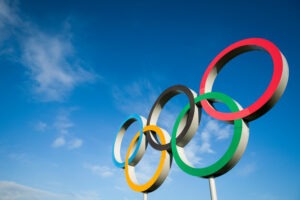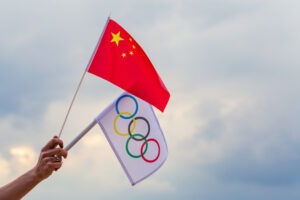Sports Mega-Events Pose Mega PR Problems
Published on April 3, 2023, at 2:32 p.m.
by Hailey Castillo.
Sports mega-events are defined as “one-time sporting events of an international scale” that yield

“extremely high levels of media coverage and impacts.” These familiar events include the likes of the summer and winter Olympics, as well as the FIFA World Cup. For host countries of these events, the benefits appear to be valuable — the events can be used as an image management strategy, can build nationalism and can even be an international stage for propaganda.
Since the fall of the Soviet Union, Russia has tried extremely hard to create a national identity through sports. The Soviet Union was a powerful force in the international sporting realm, and Vladimir Putin tried to mirror that with Russia after the USSR fell. Putin’s efforts led to the hosting of different sports mega-events, like the 2014 Winter Olympics in Sochi and the 2018 World Cup in Moscow.
In 1936, Nazi Germany used the Berlin Summer Olympics to make the country seem peaceful and united to tourists despite the ongoing persecution of Jewish people by Adolf Hitler. The country promoted Aryan superiority and was arguably successful, given that Germany brought home 89 medals.

In 2019, International Olympic Committee (IOC) President Thomas Bach stated, “The Olympic Games are the only event that brings the entire world together in peaceful competition.”
Hosting the Olympics presents the opportunity to not only unite all the competing countries in one village but also has the benefits of valuable tourism and increased revenues and tax collection for host governments. However, there are a plethora of drawbacks that suggest hosting sports mega-events, especially the Olympics, is not worth it.
Environmental impact
Since the 1980s, the winter Olympics organizers have used artificial snow on competition slopes to ensure that athletes get to compete in consistent conditions. While this may make sense in terms of fairness, logistically it puts athletes in an unsafe and unfamiliar position as they train on real snow, and it is also horrible for the environment.
It is estimated that the 2022 Beijing Olympics alone required 49 million gallons of water to create conditions for

Alpine events — that’s enough to fill over 74 Olympic-sized swimming pools. According to Olympics officials, the water produced from the melted snow in Beijing was later stored in a reservoir and in two lakes. However, machines used to produce the snow consume a vast amount of energy, which is “both costly and can be a drain on significant water resources.” With that in mind, there’s no doubt that the Olympics causes irreversible damages to the environment and contributes to climate change, water pollution and deforestation.
Community impact
Hosting the Olympics requires disruption to the city and poses a major problem for the people who live there, as displacement and gentrification are the norm for preparing for the Games. For example, the IOC requires cities hosting the summer Games to have a minimum of 40,000 hotel rooms available to spectators, as well as internal and external transportation facilities for tourists to get to and from the venues. While the Games can potentially increase tourism, boost local economies and create a sense of national pride, they can also be burdensome. The infrastructures created for the Games often become abandoned wastes of space in the host countries.

Since 1960, all Olympic Games have gone over budget by an average of 172% with the 2022 Beijing Winter Olympics costing over $38.5 billion compared to its original $3.9 billion budget. These billions of dollars could have been spent on literally anything else, considering that the last time a city profited from hosting the Olympics was in 1984.
Cities also typically spend between $50 and $100 million just to cover the cost of planning, hiring consultants, organizing events and travel alone — these costs do not include the actual price of hosting. Tokyo spent $150 million on its failed bid for the 2016 Games and eventually lost even more money when it hosted the 2020 Summer Olympics after it was postponed, and then held without spectators.
Governmental relations
Like anything on an international stage, hosting the Olympics has its risks, especially when it comes to political issues. Sports fans and activists accuse host countries of sportswashing, which is when a government, company or body attempts to improve its reputation through sporting events.
In 2022, Britain, Australia, Canada and the United States joined a diplomatic boycott of the Beijing Winter

Olympics. In December 2021, then Press Secretary Jen Psaki of the Biden administration said that the reason for the United States’ diplomatic boycott was due to “the [People’s Republic of China’s] ongoing genocide and crimes against humanity in Xingjiang and other human rights abuses.”
Moral crisis
The Olympics is no stranger to public criticism. New York Times staff editor Spencer Bokat-Lindell brought attention to the many controversies the Olympics has been involved in, including bribery, corruption, cheating and hosting the Games during the pandemic. In 2021, the 2020 Tokyo Summer Olympics took place, despite the majority of people in Japan preferring the Games be further postponed due to the ongoing pandemic. Although it was the first Olympics without spectators, the prime minister had to declare an official state of emergency during the entirety of the Games.

More criticism grew before the 2022 Beijing Winter Olympics due to the People’s Republic of China President Xi Jinping’s presiding over crimes against humanity in the far western region of Xinjiang that is home to several Muslim minorities. Since 2017, the Chinese government has imprisoned more than one million people and “subjected those not detained to intense surveillance, religious restrictions, forced labor, and forced sterilizations.” A spokesperson of the Beijing Games, however, denied the human rights violations allegations, despite several countries warning of a genocide in the region before the Games even began.
The 2022 Winter Olympics in Beijing was also not the first time a host country faced criticism regarding human rights issues. Beijing was under fire for similar circumstances the first time it hosted the Olympics in 2008, and activists also protested the 2014 Olympics in Sochi, Russia, due to the “exploitation of migrant workers, forced evictions as well as harassment and arrest of activists and journalists who were critical of the government’s Olympic preparations.”
Host country reputation
At its surface, hosting the Olympics seems like a golden ticket for a country to flourish; however, the hosts rarely get to inherit the chocolate factory. The Games frequently bring more attention to the negative factors like the ones mentioned above, rather than garner international recognition or enhance the image of the host country.
In the past, cities and countries have been able to use the Olympics to change how they are globally perceived, but it appears that today’s call for accountability will no longer allow the facade of the Games to distract from host countries’ real-world problems.
PR solution
While the IOC claims to be a politically neutral organization, its complicity in the political affairs of host countries is not a good look. Considering all the factors, one thing is for certain — changes must be made.
In the Host City Contract Principles for Paris 2024, the IOC stated that the host city shall “prohibit any form of discrimination,”

“protect and respect human rights” and “refrain from any act involving fraud or corruption” — only in activities related to the organization of the Games. Essentially, the IOC doesn’t care what a country does as long as it doesn’t directly involve the Games, but it might as well pretend.
With these things considered, hosting the Olympics is typically bad publicity for the host country — especially if it’s one that has ongoing issues that can’t be fixed simply with a sporting event. To avoid some of these problems that come along with hosting the Olympics, the pragmatic approach is to find a permanent, unproblematic location that could actually benefit for the Games to be held.
Jennifer Cole of the Toronto Star said it best: “When an event promoted to enhance the harmonious development of humankind becomes politicized due to where it’s held, it’s time to pivot.”




